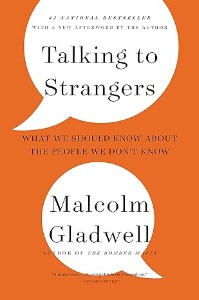Unpacking 'Talking to Strangers' by Malcolm Gladwell
Dive deep into Malcolm Gladwell's 'Talking to Strangers: What We Should Know about the People We Don't Know.' Explore why this bestseller is making waves with its timely topics, relatable content, and Gladwell's masterful storytelling. Learn how better communication tools and self-reflection can change how we interact with strangers and understand ourselves.
Table of Contents
Unpacking "Talking to Strangers" by Malcolm Gladwell
Hey folks! Today, I wanna dive deep into a book that's been making waves, rattling cages, and straight-up changing how we see the world: "Talking to Strangers: What We Should Know about the People We Don't Know" by the one and only Malcolm Gladwell. If you're not already familiar with this title, strap in because you're in for a wild ride!
What's the Big Deal?
Alright, let’s kick things off with a quick intro to the book. Gladwell, who's also the brain behind the podcast Revisionist History and some other killer bestsellers like Outliers and The Tipping Point, takes us on an intellectual adventure here. This book is all about those awkward, confusing, and sometimes disastrous interactions we have with people we don't know. You know, like why your first date went south or why that job interview felt so off.
In Talking to Strangers, Gladwell digs into some pretty heavy historical and current events—stuff like Fidel Castro fooling the CIA, Chamberlain's misplaced trust in Hitler, and the tragic death of Sandra Bland. It's not just a history lesson though; Gladwell’s main point is that we're using all the wrong tools to understand strangers, which is leading to a whole lotta conflict and misunderstanding.
Why Is It a Bestseller?
Now, you might be thinking, “Okay, sounds interesting, but why’s it such a big hit?” Here’s the lowdown:
1. Relatable AF
Gladwell’s got this knack for taking big, complex ideas and breaking them down into bite-sized, relatable chunks. He uses real-world examples, some of them super controversial, which makes the book feel very immediate and relevant. Think about the buzz around the Amanda Knox trial or the Bernie Madoff scandal—these are stories we all kinda know, but Gladwell spins them in a way that makes you rethink everything.
2. Storytelling Like No Other
Honestly, the guy’s got a gift for storytelling. Whether he’s talking about the CIA or sitcoms, he weaves these tales with such finesse that you can’t help but keep turning the pages. It's like reading a thriller, but you’re also learning a ton.
3. Timely Topics
The book couldn’t have come at a better time. With the world feeling more polarized than ever, Talking to Strangers hits on themes of misunderstanding and miscommunication that are super relevant. Whether it’s about racial divisions, political divides, or just everyday interactions, Gladwell’s insights feel crucial.
4. Big Picture Thinker
Gladwell isn't just about the details; he’s a big-picture guy. He’s got this ability to connect the dots in ways that make you go, “Whoa, I never thought about it like that!” Whether it’s through quirky anecdotes or deep dives into psychological research, he’s always making those broader points that make you reflect on your own life.
What Can We Learn?
So, what can we take away from this book, besides some killer anecdotes to share at parties?
Stop Assuming
Gladwell makes it pretty clear: we need to stop assuming we know what's going on in other people's heads. No one’s transparent, and we’re often missing the unseen circumstances that shape behavior.
Better Communication Tools
We need better tools and strategies for interacting with strangers. The stuff we’re using now? Yeah, it's not working. Gladwell’s book is a call to rethink and refine our approach.
Reflect on Ourselves
It's not just about understanding others; it’s also about understanding ourselves. How often do we project our own biases and expectations onto others? Talking to Strangers makes you look in the mirror and question your own assumptions.
Final Thoughts
In a nutshell, Talking to Strangers is more than just a book; it’s an eye-opener. It's a mix of history, psychology, and some seriously gripping storytelling. If you haven’t read it yet, do yourself a favor and grab a copy. It's not just going to change how you see strangers; it might just change how you see the world.
So, there you have it! A deep dive into why Malcolm Gladwell’s latest book is a must-read. Trust me, this one’s worth your time.
Catch ya later, and happy reading!
Check it out on Amazon.
Story updated onSeptember 4, 2024
Table of Contents

Talking to Strangers: What We Should Know about the People We Don't Know
Malcolm Gladwell